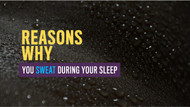Reasons Why You Sweat During Your Sleep
Posted by Ethan Wright on 26th Nov 2020
When you experience hot or cold sweating in the middle of the night, you may be suffering from a condition called “Night Sweats,” also known as Sleep Hyperhydrosis. For most people, sweating usually happens during the day but a rare few get to experience most of the sweating while trying to catch their dreams, at a time when the body is supposed to be at rest, even though excessive sweating is that usually first manifests in early adulthood.
There are several causes of night sweats:
Genetics and Heredity
Genetics and Heredity can also greatly contribute to a sufferer having night sweats. It anyone in your immediate family is suffering it, there’s a big possibility of you inheriting the condition as well.
Pregnancy
Pregnancy can also make the hormones imbalance. Most pregnant women experience not only night sweats but excessive sweating during the day as well.
Menopause
Women around 50 years of age may experience irregular periods, palpitations, and bad, irritating days. Chances are you may be undergoing perimenopause. Night sweats are a common symptom of this condition. The hot flashes that accompany the menopausal transition can occur at night and cause sweating. A typical indication of a female hormone imbalance that makes your system go out of whack.
Medication or Drugs
The use of over the counter drugs or the withdrawal symptoms from it may also be a factor in the occurrence of night sweats. Taking certain medications can lead to night sweats. Antidepressant medications are a usual type of medication that can lead to night sweats. All types of antidepressants can cause night sweats as a side effect. Other psychiatric drugs have also been associated with night sweats. Some of the many drugs that can cause flushing include Niacin (taken in the higher doses used for lipid disorder), Tamoxifen (Nolvadex), Hydralazine (Apresoline), Nitroglycerine, Ansildenafil (Viagra). Many other drugs including Cortisone medications, such as Prednisone and Prednisolone may also be associated with flushing or night sweats.
Neurologic Conditions
Uncommonly, neurologic conditions including Autonomic Dysreflexia, post-traumatic Syringomyelia, stroke, and Autonomic Neuropathy may cause increased sweating and may lead to night sweat.
Underlying Medical Condition
There may be an underlying medical condition that is causing the sweating. You may not realize it, but there may be other symptoms as well. You just tend not to notice it due to the excessive sweating. It’s always best to consult your doctor about this just to be on the safe side.
Underlying medical condition to night’s sweating includes:
Epilepsy
Head injury
HIV
Gastroesophageal reflux disease
Pneumonia
Obstructive sleep apnea
Lyme disease
Urinary tract infection
Hypoglycemia
Sometimes low blood glucose can cause sweating. People who are taking insulin or oral anti-diabetic medications may experience hypoglycemia at night that is accompanied by sweating.
Infections
Classically, tuberculosis is the infection that most notoriously associated with night sweats. However, bacterial infections, such as Endocarditis (inflammations of the heart valves), Osteomyelitis (inflammation within the bones), and Abscesses all may result in night sweats.
Cancer
Night sweats are an early symptom of some cancers. The most common type of cancer associated with night sweats is Lymphoma. However, people who have cancer undiagnosed frequently have other symptoms as well, such as unexplained weight loss and fevers.

